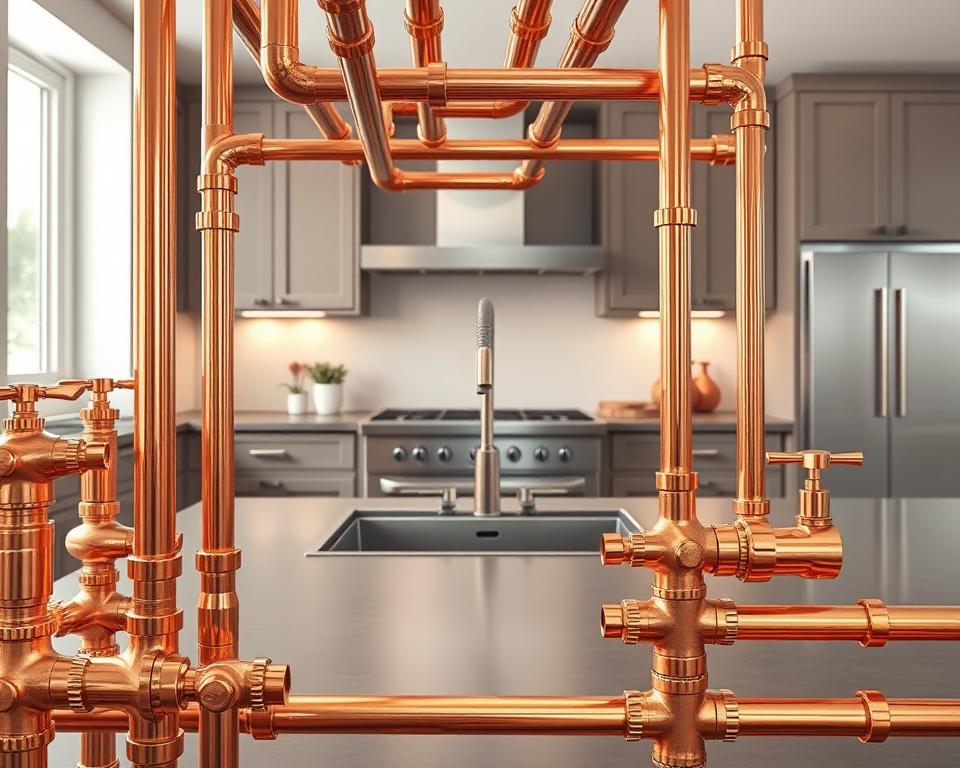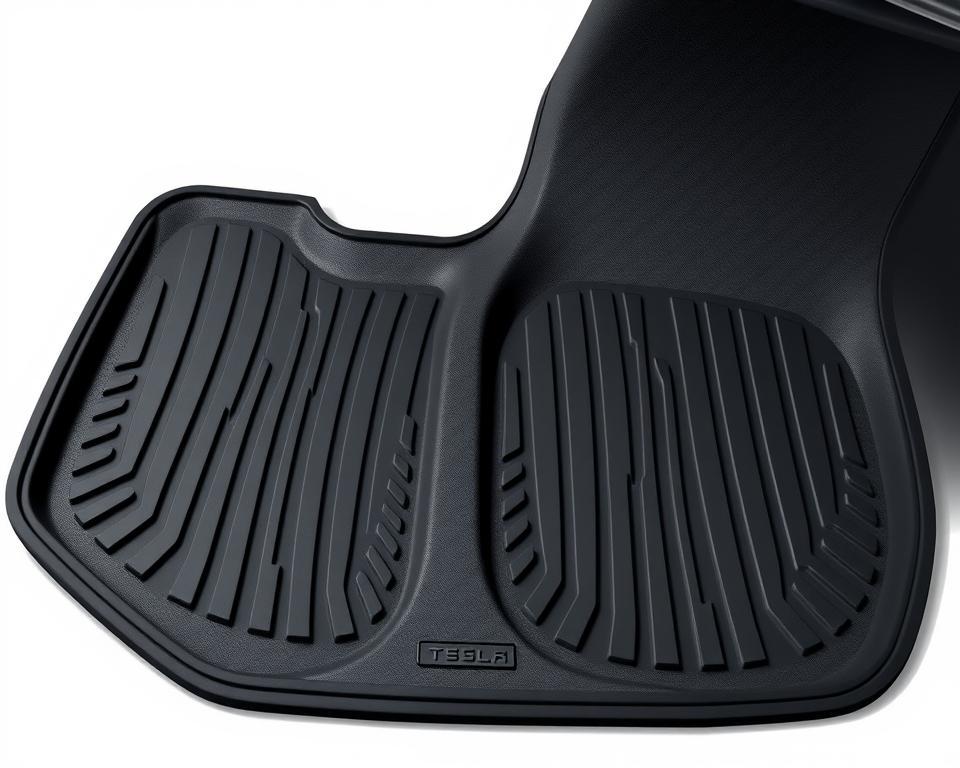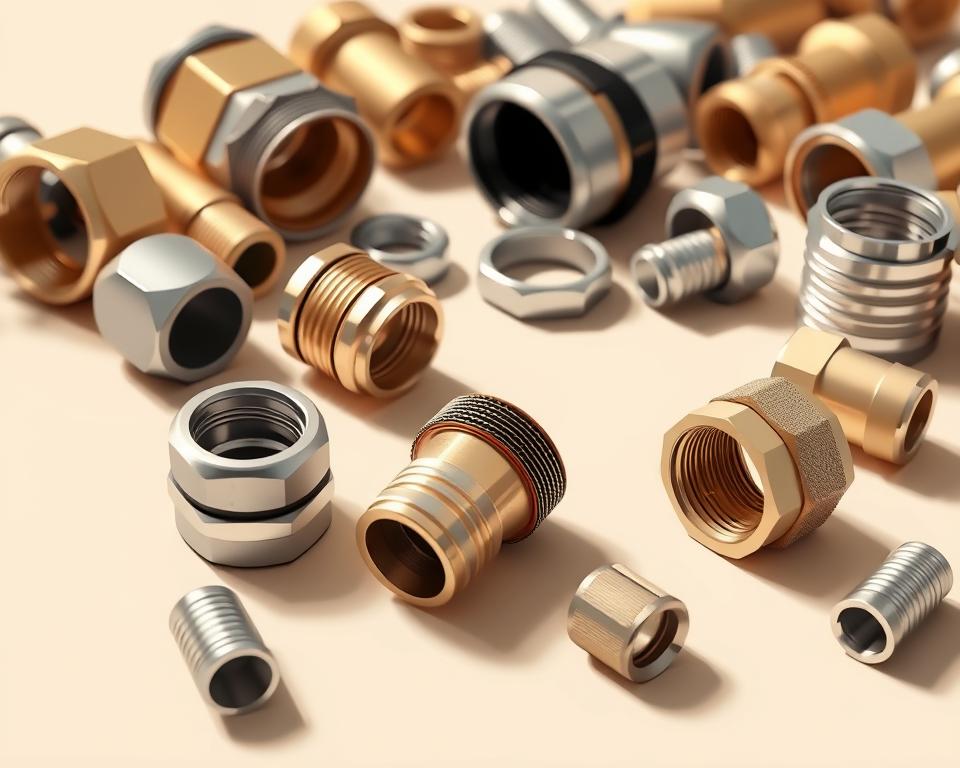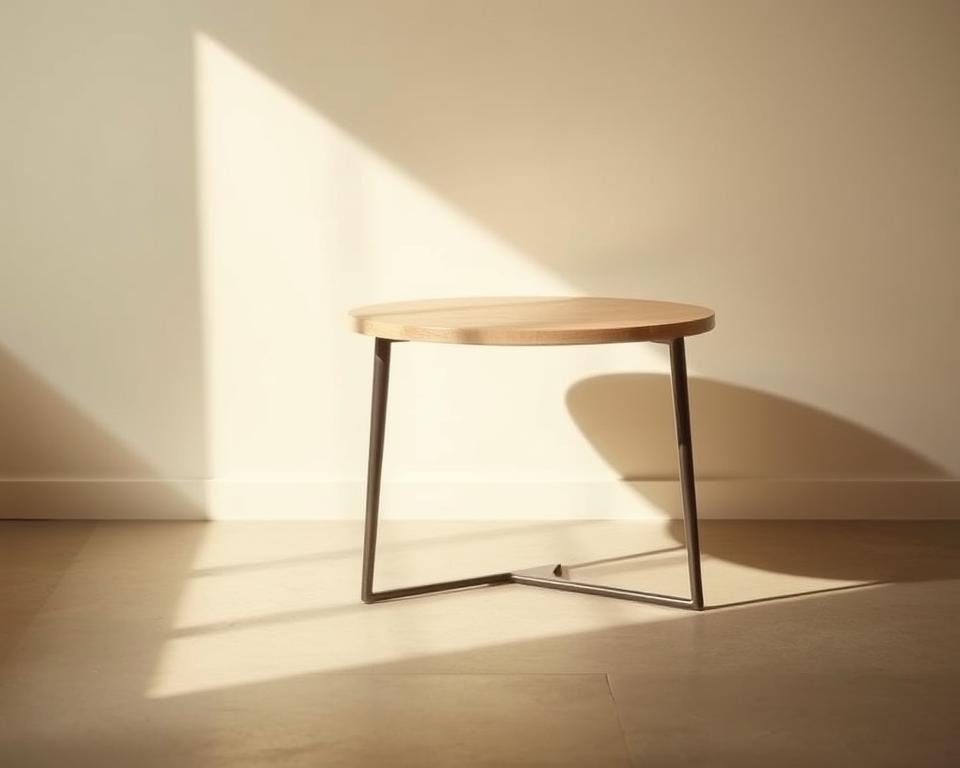Understanding Copper Pipe Sizes for Residential Water Lines
It may surprise you that approximately 30% of residential plumbing failures come from improper pipe sizing. Choosing the right dimensions ensures optimal water pressure and system efficiency. This guide helps homeowners understand the basics of sizing for residential projects.
Correct sizing hinges on elements such as flow rate needs and pipe wall thickness. Standard 1/2 copper pipe OD sizes run between 1/4″ and 8″ across, noted by NPS versus actual exterior measurements. Installation Parts Supply provides professional advice to align your home requirements with code-compliant options.
Copper continues leading the pack because of its strength and ability to resist corrosion. Whether you’re upgrading existing systems or planning new installations, understanding these fundamentals saves time and prevents costly mistakes.
Critical Findings

- Proper sizing averts 30% of typical plumbing failures
- Common sizes run between 1/4″ and 8″
- NPS labels don’t match real outer diameters
- Proper sizing maintains water pressure and efficiency
- Copper offers durability and corrosion resistance
- Expert advice guarantees compliance
Reasons to Select Copper for Your Plumbing
Durable plumbing depends on material choice—copper leads the way because: Its 50+ year lifespan and NSF certification for drinking water make it a top pick for homeowners. It uniquely blends durability with environmental responsibility.
Toughness and Rust Protection
Copper naturally resists rust and chemical damage, outperforming PVC or PEX. Smooth bore reduces friction, keeping water pressure steady. Practical tests confirm decades of leakless performance.
Find certified, high-grade selections at Installation Parts Supply for your requirements. Higher entry price pays off through reduced future maintenance costs.
Bendability and Freeze Safety
In chilly regions, copper expands just enough when freezing to avoid splits. This give lowers the likelihood of pricey cold-weather failures. Pair it with proper insulation for maximum freeze protection.
Green and Antibacterial Advantages
Copper is 100% recyclable, reducing environmental impact. Its germ-killing traits help safeguard against bacterial contamination. Environmentally minded users find it superior to plastic substitutes.
Understanding Copper Pipe Water Line Sizes and Types
Many homeowners struggle with pipe sizes—let’s break it down. The industry uses Nominal Pipe Size (NPS), which doesn’t match the actual outer dimensions. As an instance, 1/2″ NPS measures 0.625″ across externally.
Labeled vs. True Pipe Sizes
NPS numbers are labels, not exact measurements. Always check the outer diameter (OD) before purchasing. Use this quick conversion guide:
- 1/4″ NPS corresponds to 0.375″ OD
- 1/2″ nominal → 0.625″ actual
- 3/4″ NPS = 0.875″ OD
Comparing Types L, M & K
Three copper variants lead in home plumbing. Use-case depends on each type’s wall thickness:
- Type L: Thin-wall (0.040″ @ 1/2″), suited for typical dwellings.
- Type M: Medium-wall (0.050″ for 1/2″), balances cost and durability.
- Type K: Thick-wall (0.060″ @ 1/2″), meant for high-pressure use.
Type M is suggested by Installation Parts Supply for broad residential use. Larger diameters (over 2″) often require Type K for irrigation or commercial use.
L-Type Copper Pipes: Slim and Adaptable
For homeowners tackling DIY projects, L-type offers unmatched flexibility. A slender wall cuts both heft and expense without sacrificing dependability. Available in rigid sticks or soft coils, it adapts to everything from HVAC lines to drain systems.
L-Type Uses and Constraints
It’s perfect for low-PSI situations. A 0.040″ gauge suits:
- HVAC refrigerant lines
- Drain-waste-vent (DWV) systems
- Residential water supply (below 80 PSI)
Avoid high-pressure systems—thicker-walled alternatives like Type K handle those better. Up to 50ft flexible coils hug corners, though bending must be gentle to prevent pinches.
L-Type Sizing and How to Install
Choose from 1/4″ to 8″ diameters, with these popular options:
| Form | Max Length | Best For |
|---|---|---|
| Rigid | 20ft | Straight runs |
| Coiled | 50ft | Tight spaces |
Beginners will find rigid lengths, as recommended by Installation Parts Supply, the easiest to cut and solder. For large projects, coiled options reduce joint counts, saving time and potential leak points.
Type M Copper: Balanced Performance
Moderate cost plus solid performance make M-type a homeowner favorite. Medium gauge copes with routine loads yet stays budget-friendly. Approved by NSF for water and gas, it works in kitchens, baths, and heating.
M-Type Best Applications
Perfect for mixed hot/cold service, keeping water pressure uniform. Rigid 12ft sticks fit straight sections; 100ft coils flex around obstacles. Typical uses cover:
- Drinking water distribution
- Medical gas lines (oxygen, nitrous oxide)
- HVAC refrigerant lines
Wall Thickness and Pressure Tolerance
It balances the characteristics of L and K. 0.050″ thickness (1/2″) withstands pressures up to 150 PSI. Review these benchmarks:
| Type | Wall Thickness (1/2″) | Max Pressure | Best For |
|---|---|---|---|
| L | 0.040″ | 80 PSI | Low-pressure DWV |
| M | 0.050″ | 150 PSI | Residential supply |
| K | 0.060″ | 200 PSI | Irrigation |
Find M-type in every common size at Installation Parts Supply. For gas lines, pair with flare fittings to prevent leaks. Allow slight expansion gaps in hot water runs to accommodate thermal movement.
Type K Copper Pipes: Heavy-Duty Performance
When durability matters most, K-type delivers unmatched strength for demanding projects. Thick gauge and strong PSI rating enable industrial and subterranean applications. It outperforms slimmer options by standing up to crushing and corrosion.
Heavy-Duty Use Cases
Where weaker pipes give out, K-type endures. At 0.060″ gauge, it manages 200 PSI, ideal for:
- Underground irrigation systems
- Commercial HVAC refrigerant lines
- Fire sprinkler networks
Installation Parts Supply advises an 18″ burial depth for underground runs. Use compression connectors tightened to 25 ft·lb to seal joints.
Rigid vs. Coil: Installation Advice
Select between stick or coil based on needs. Rigid 12ft sticks suit straight runs, while 50ft coils navigate obstacles. Compare performance:
| Form | Best For | Limitations |
|---|---|---|
| Rigid | High-pressure mains | Requires more fittings |
| Coiled | Trenchless installations | Risk of kinks if bent sharply |
In irrigation layouts, allow 10% for thermal growth. Rigid sections require a bending tool to prevent efficiency-sapping kinks.
Installing and Caring for Copper Pipes
Correct methods deliver years of drip-free operation. DIYers or professionals alike benefit from mastering these fundamentals. Follow these methods to achieve secure, long-lasting results.
Connection Options Compared
Pick a method suited to your application. Use solder or compression for lasting joins; temporary fittings for flexibility. See which suits you best:
| Method | Pros | Cons | Best For |
|---|---|---|---|
| Soldering | Strong, permanent | Requires skill | Water supply lines |
| Compression | No heat needed | Bulky fittings | Tight spaces |
| Push-Fit | Quick installation | Higher cost | Emergency repairs |
How to Solder Copper Pipes
For a flawless joint, follow these steps:
- Thoroughly clean with emery cloth.
- Apply flux evenly to both pieces.
- Heat until the flux bubbles.
- Feed solder to the joint; capillary action pulls it through.
Protective gloves and fresh air are a must. Find NSF-approved, lead-free solder at Installation Parts Supply for water systems.
Leak Prevention & Freeze Protection
Wrap pipes in unheated zones with foam sleeves. Use foam sleeves for pipes running through exterior walls. Repair advice includes:
- Inspect fittings yearly for green patina indicating leaks.
- Support horizontal runs every 32 inches to prevent sagging.
- Choose freeze-safe taps in winter-prone areas.
A yearly review stops small leaks from worsening. Stash wrenches, cutters, and Teflon tape in your kit for fast repairs.
Conclusion: Selecting the Right Copper Pipe with Installation Parts Supply
With good planning, your plumbing will last—remember these highlights. Choose proper size and type for lasting durability. Remember:
- Type M suits most homes, while K handles heavy-duty jobs
- Accurate dimensions keep pressure up and leaks down
- Frost defense matters where it gets cold
Get specialist advice from Installation Parts Supply to streamline decisions. Certified solutions with quality warranties keep your plumbing systems running perfectly.
Looking for assistance? Get free sizing charts or book a consultation now. First orders receive unique deals—kick off your job the best way!


